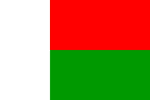
Madagascar
Madagascar President resigns, unclear rule in Antananarivo
More prisoners escape in Madagascar
Daewoo leases African plantation
13 missing from ship off coast of Madagascar; two rescued
MADAGASCAR: New eco-deals protect unique forests
MADAGASCAR: Despite odds, country saves more trees
National name: Repoblikan'i Madagasikara
Geography
Capital: Antananarivo
Major Towns: Antananarivo, Toamasina, Tulear, Fianarantsoa, Nosy Be, Manakara
Location (geographical coordinates/latitude and longitude): Antananarivo: 18°55'S, 47°31'E
Time Zone: EAT (UTC+3)
Size (Land and Sea): 587,041 km², Water: 0.13%; the fourth largest island in the world
Borders with: Madagascar is an island nation in the Indian Ocean, off the southeastern coast of Africa
Elevation extremes: Lowest point: Indian Ocean 0 m, highest point: Maromokotro 2,876 m
Politics
Head of State: President: Marc Ravalomanana, Prime Minister: Charles Rabemananjara
Form of Government: Republic
Independancy (from France): 26 June 1960
Currency: Malagasy franc
Industry
Main industries: Tourism; textile and light manufacturing exports; and mining
Industries: meat processing, soap, breweries, tanneries, sugar, glassware, cement, automobile assembly plant, paper, petroleum, tourism.
Natural resources: graphite, chromite, coal, bauxite, salt, quartz, tar sands, semiprecious stones, mica, fish, hydropower
Agriculture: Madagascar is the world's leading producer of vanilla; coffee, sugarcane, cloves, cocoa, rice, cassava (tapioca), beans, bananas, peanuts; livestock products
Population and People
Population: 19,448,815 (2007 est.); 18,606,000 (July 2005 est.), 12,238,914 (1993)
Population density per sq mi: 87
Growth rate: 3.03% (2002 est.)
Birth rate: 38.6 births/1,000 population (2007 est.)
Total fertility rate: 5.24 children born/woman (2007 est.)
Infant mortality rate: 57.0/1000
Religion: indigenous beliefs 52%, Christian 41%, Muslim 7%
Languages: Malagasy, French, Chuukese
Ethnic groups / Tribes: mixed Austronesian (Pacific Islander) and African origin
Age structure: 0-14 years: 43.9% (male 4,297,985/female 4,243,369); 15-64 years: 53% (male 5,117,874/female 5,190,032); 65 years and over: 3.1% (male 270,411/female 329,144) (2007 est.)
Life expectancy: 62.1
Literacy: 80% (1990 est.)
- The fourth-largest island in the world
- Home to 5% of the world's plant and animal species
- More than 80% of the plants and animals are endemic to Madagascar
- Madagascar island split from Africa some 80 million years ago
- Archaeologists estimate that humans arrived on Madagascar between 200 and 500 A.D
- Madagascar is the world's leading producer of vanilla and accounts for about half the world's export market
- Madagascar has been called the "Great Red Island" because of the importance of red lateritic soils
- Mount Maromokotro on the Ankaratra Massif is the highest mountain with an altitude of 2,876m
- Some ecologists refer to Madagascar as the "eighth continent" because of its unique flora and fauna
- Vanilla has historically been of particular importance, and when in 1985 Coca-cola switched to New Coke which involved less vanilla, Madagascar's economy took a marked downturn, but returned to previous levels after the return of Coke Classic (Wikipedia)
- Madagascar has spectacular landscapes, from golden beaches to rainforests, volcanic massifs, highlands and mangrove swamps
- Approximately 50% of the country's population practice traditional religion
- The Merinas’ and Betsileos’ practice the famadihana, or "turning over the dead" in which relatives' remains are removed from the family tomb, rewrapped in new silk shrouds, and returned to the tomb (or sometimes a new one far away from the old one) following festive ceremonies in their honour where sometimes the bodies are lifted and carried high above the celebrants heads with singing and dancing before returning them to the tomb.
- Beautiful coastline with white beaches and palm trees
- Whale-watching in July and August when whales travel passed Madagascar
- Madagascar has about 3,000 indigenous species of butterfly
- Parc National de L'Isalo is one of the country's most spectacular regions in the hauts plateaux
- The capital Antananarivo is shortened to Tana and has a pleasant French flair. Its daily Zoma Market claims to be the second-largest in the world.
 Text Area - Madagascar
Text Area - Madagascar Content List - Madagascar News
Content List - Madagascar News


 Map - Madagascar Map
Map - Madagascar Map